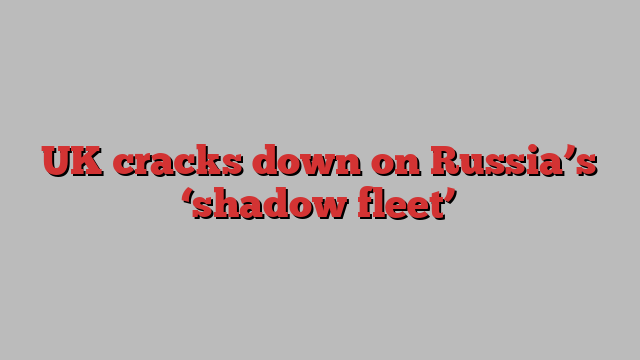
Stay informed with free updates
Simply sign up to the War in Ukraine myFT Digest — delivered directly to your inbox.
The UK has announced its largest package of sanctions against Russian shipping, including restrictions on six tankers recently identified by the Financial Times as part of Moscow’s so-called shadow fleet.
The measures against 18 oil tankers and four liquefied natural gas vessels follow a commitment by the UK and 43 other European countries in July to disrupt and deter the shadow fleet by targeting its “ships and facilitators”.
Ukraine’s western allies are seeking to limit Russia’s ability to spend oil revenues on crucial components and systems for its war effort by targeting intermediaries in third countries. On Thursday, the US announced sanctions against two Chinese companies that it said were producing a long-range attack drone that Russia is using in Ukraine.
The shadow fleet is part of a sprawling network of entities around the world that help the Kremlin fund and supply its invasion.
Since the first western restrictions on Russian oil exports were introduced in December 2022, Moscow has expanded the capacity of the shadow fleet, circumventing sanctions and generating billions of dollars a year in additional revenue for its war effort.
“I have made it my personal mission to constrain the Kremlin, closing the net around [Russian President Vladimir] Putin and his mafia state using every tool at my disposal,” said UK foreign secretary David Lammy.
As part of the latest measures, the UK said it would also challenge vessels passing through the English Channel about their insurance status, allowing London to use its position on a major shipping route to gather information about the coverage being used by the shadow fleet.
Among the 18 oil tankers targeted with UK sanctions on Thursday, six were vessels originally acquired by a British accountant called John Ormerod between December 2022 and August 2023, the FT reported last week.
Ormerod bought the vessels on behalf of Eiger Shipping DMCC, the Dubai-based shipping arm of Russia’s Lukoil, which financed the purchases by paying in advance to charter the ships.
Lawyers for Ormerod told the FT that he undertook “extensive due diligence” to establish that the transactions would not violate any sanctions. He divested his ownership after becoming “aware of and concerned by the number of voyages relating to Russian trade”, they added.
Litasco Middle East DMCC, which controls Eiger, told the FT it conducted its operations “in strict compliance with all relevant laws”. Neither Ormerod nor Litasco immediately responded to requests for further comment on Thursday.
The UK also listed Everest Energy, an LNG tanker revealed by the FT to have shipped gas from Russia’s sanctioned Arctic LNG 2 project to a floating storage unit.
Sanctions-listing of ships, rather than the companies or people around them, are a recent innovation for the UK, which only passed legislation to enable this targeting in May. This approach proved to be successful when the US listed 42 vessels in late 2023 and the first half of 2024, making the ships much harder to use.
In total, the UK has now sanctioned 43 oil tankers and 9 LNG tankers. Those vessels are barred from UK ports and unable to access British maritime services.
In addition, the UK on Thursday imposed sanctions on the Russian gas company Rusgazdobycha JSC, as part of efforts to increase pressure on Moscow’s gas industry.
Putin has doubled down on the war effort more than two and a half years since ordering the full-scale invasion of Ukraine in February 2022.
Russia plans to spend a record Rbs17tn ($175bn), or 40 per cent of its total budget, on defence and security next year.
With the country’s arms factories working at full capacity and its ability to produce sophisticated components limited, much of Russia’s efforts are directed to sourcing components, and even entire weapons systems, from abroad.
The US blacklisted two Chinese companies, Xiamen Limbach Aircraft Engine Co and Redlepus Vector Industry Shenzhen Co Ltd, for producing components for Russia’s Garpiya drone.
The drone was designed by China-based experts and is produced at Chinese factories under the direction of a subsidiary of Almaz-Antey, one of Russia’s largest arms manufacturers. The US also sanctioned a Russian procurement company overseeing procurement for the drone, as well as its general director.
Russia has already deployed the drones in Ukraine, destroying critical infrastructure and causing mass casualties, US officials said.
Though the US has previously sanctioned several Chinese companies involved in supplying critical components for Russia’s defence industry, this is the first time it has targeted a joint Russia-China weapons production effort intended for battlefield use in Ukraine.
“Russia increasingly relies on the expertise of foreign professionals and the import of sophisticated technologies to sustain its weapons programme and advance its military campaign against Ukraine,” said Bradley T Smith, acting under-secretary of the US Treasury for terrorism and financial intelligence.
“We will continue to disrupt the networks that enable Russia’s acquisition and use of these advanced weapons.”